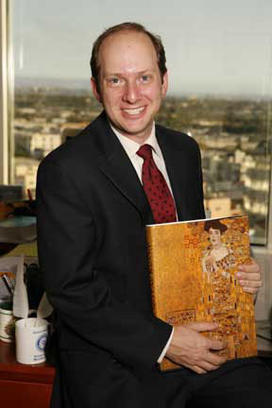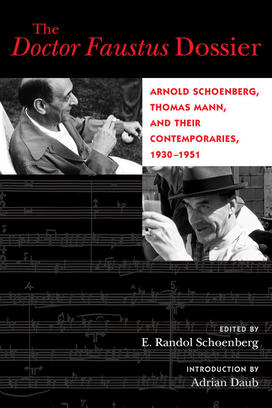The book: Arnold Schoenberg, a renowned 20th-century composer, and literary giant Thomas Mann found themselves in the same community of German exiles in Los Angeles during the Nazi era. The Doctor Faustus Dossier (University of California Press) is a collection of their letters to each other, centering on their famous dispute over Mann’s novel Doctor Faustus. The volume features letters from Theodor Adorno as well, a philosopher who was close to Mann when he wrote the book and whose interference in the composer and author’s dispute led to him becoming an enemy to both. Compiled by Arnold Schoenberg’s grandson, E. Randol Schoenberg ’88, The Doctor Faustus Dossier presents an in-depth look into Mann and Schoenberg’s private lives through letters gathered for the first time in English.
The authors: E. Randol Schoenberg ’88 had yet another famous grandfather: composer Eric Ziesel. He is an expert handler of court cases that involve looted art and recovering property stolen by the Nazis in the Holocaust. Adrian Daub is a professor of comparative literature and German studies at Stanford University and has written several books.
Opening lines: “Sunset Boulevard curves its way from downtown Los Angeles twenty-two miles westward along the southern side of the hills of Hollywood, Bel Air, Beverly Hills, Brentwood, and Pacific Palisades, where, facing the red, late-afternoon sun, it empties into the Pacific Ocean. During World War II, the leading figures of the European émigré community found refuge in the sunny hills above Sunset Boulevard, and it was along the westernmost portions of that renowned thoroughfare that Arnold Schoenberg and Thomas Mann lived as neighbors for years… Although they were neighbors geographically, Arnold Schoenberg and Thomas Mann were not close friends. They met only occasionally, mostly at the salons of Alma Mahler-Werfel and Salka Viertel, who each had close ties to literary and musical circles.”
Reviews: “The storied triangulation of Schoenberg, Mann, and Adorno in all its contentious glory is presented in the most comprehensive assemblage of primary documents ever gathered in English translation.” — Joy H. Calico, author of Arnold Schoenberg’s “A Survivor from Warsaw” in Postwar Europe













1 Response
Norman Ravitch *62
7 Years AgoThose Who Did Not Escape
I confess I have very mixed feelings about these refugees from Hitler, whether racial or political, who found heaven in the California sunshine or on the Upper West Side of Manhattan. They were able there to continue their cultural interests and to pursue their rivalries in peace and comfort as if they were still in Vienna, Prague, or Munich. And some had lost many art treasures which would only be restored to their families almost a century later, thanks to legal processes they could not even imagine.
Why mixed feelings? Well, many of these German and central European refugees escaped after all with their lives and rebuilt them in safer surrounding. But I think instead of the millions who did not escape, who were hustled to their deaths and incarcerations by the Nazis and their collaborators, but not before they were deprived -- not of their artworks, of which they had none -- of even their gold teeth! So the interest in them and in their activities and in their restored art masterpieces leaves me very cold. Very very cold. Please excuse me.